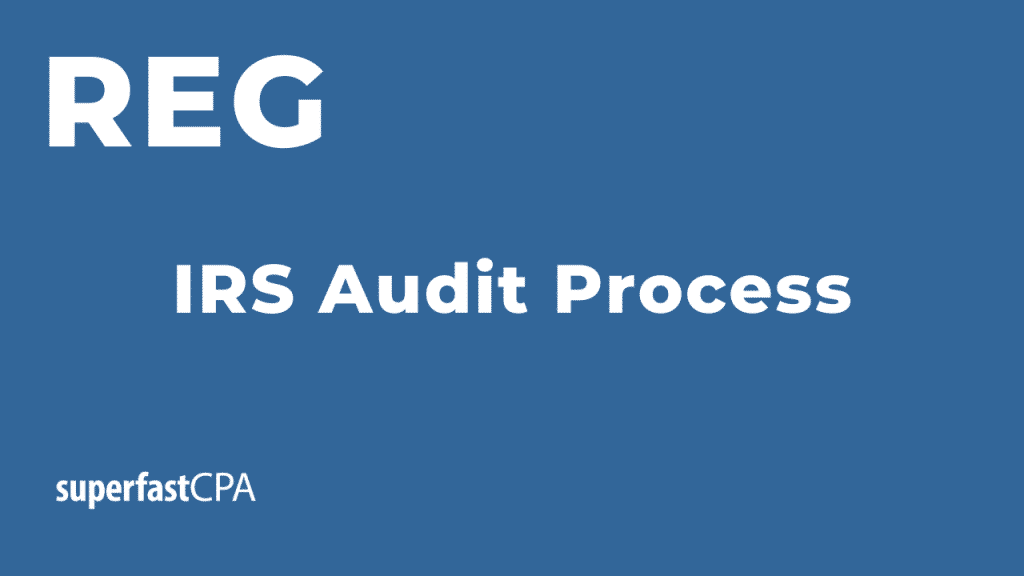This summary of the IRS audit process on the CPA exam provides the key items you should know for questions related to the IRS audit process which may appear on the REG CPA exam.
Table of Contents
IRS Audit Process on the CPA Exam
The first part of the audit process is matching up returns with W-2s and 1099s. Then returns are assigned a score, and from there the scores are used to decide which returns will be audited.
IRS Audit Time Limitations
The IRS has 3 years from the later of:
- The date the return was filed or,
- The date the return was due to impose additional tax. However, if the gross income omitted was more than 25% of the gross income claimed on the return, then the statute of limitations is 6 years.
If there was fraud involved in the return, then there is no time limitation on the IRS assessing additional taxes and penalties.
Audits can be handled through written correspondence, in the field, or in an IRS office.
The taxpayer can hire an enrolled agent, a CPA, or an attorney to represent him/her in the audit.
After the audit is complete, the IRS agent reports their audit findings in an Income Tax Examination Changes report.
Then there’s a negotiation period about whether the taxpayer agrees with the findings in the Income Tax Examination Changes report.
If an agreement is reached:
When an agreement is reached, then the agent will issue a “Revenue Agent’s Report”, which the taxpayer will sign. If the taxpayer agrees to the findings and signs this report, then the taxpayer cannot pursue relief through the appeals process, AND the IRS can’t come back later with additional judgements regarding the items listed in the report. But this only applies to the specific items outlined in the agreement.
If an agreement is not reached (the appeals process):
If the taxpayer and the agent can’t come to an agreement during the negotiation process, then the taxpayer will receive a copy of the agent’s report and a 30-day letter. The 30-day letter is a notice that the taxpayer has 30 days to appeal the decision, and it includes instructions on how to appeal. The taxpayer is NOT required to respond to this letter, and if they don’t, they will then receive a 90-day letter. The IRS wants the taxpayer to agree to the “Revenue Agent’s Report”, but again, the taxpayer is not required to respond to this 30-day letter.
If the taxpayer wants to appeal, they will file a petition to request an appellate conference. This petition needs to outline the taxpayer’s position for each item and include support for taking each position. The IRS doesn’t have to grant an appeal, but they usually will. This process takes place between the taxpayer and the IRS appeals office, as opposed to the formal judicial process. If an agreement is reached during the appeals process, then the audit process is over.
IF the taxpayer:
1) Does not reach an agreement during the appeals process, OR
2) Doesn’t respond to the 30-day letter, THEN
The taxpayer will receive the 90-day letter.
After the 90-day letter is received, the taxpayer now has 90 days to file a Tax Court petition with the U.S. Tax Court. Once a petition has been filed with the Tax Court, the IRS can’t enforce its assessment until after the Court’s decision is finalized.
If the taxpayer doesn’t file a tax court petition, after 90 days the findings of the audit are binding, and the IRS will move to collect the amounts owed. After the 90 days, the taxpayer’s only recourse is through U.S. District Court or the U.S. Claims Court, but the deficiency will have to be paid before the court process can begin.













